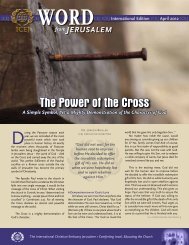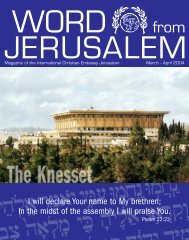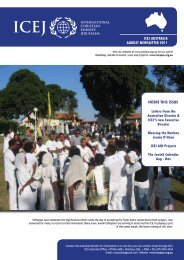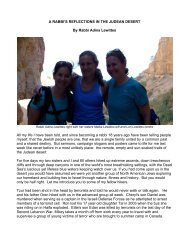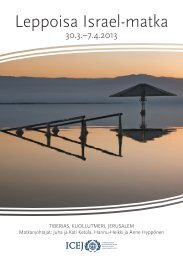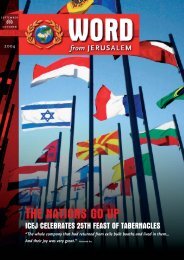WORD
The Lesson of the Almond Tree - International Christian Embassy ...
The Lesson of the Almond Tree - International Christian Embassy ...
- No tags were found...
Create successful ePaper yourself
Turn your PDF publications into a flip-book with our unique Google optimized e-Paper software.
<strong>WORD</strong><br />
ICEJ ICEJ ICEJ ICEJ ICEJ ICEJ ICEJ ICEJ ICEJ ICEJ ICEJ International Edition ICEJ April 2011 ICEJ<br />
ICEJ<br />
from<br />
JERUSALEM<br />
The Lesson of the Almond Tree<br />
Amidst our weakness, frailties and the turmoil of nations, God is Watching!<br />
It is amazing to see beautiful almond<br />
trees blossoming all over Israel every<br />
winter. They are the first tree to blossom<br />
and yet the last to bear fruit.<br />
The almond tree is associated with one of<br />
the earliest prophecies of a young Jeremiah.<br />
“Moreover the word of the Lord came to<br />
me, saying, ‘Jeremiah, what do you see?’<br />
And I said, ‘I see a branch of an almond<br />
tree.’ Then the Lord said to me, ‘You have<br />
seen well, for I am watching to perform My<br />
word.’” (Jeremiah 1:11-12)<br />
This prophecy uses a play on words that<br />
carries a vital truth for Israel as well as for<br />
us. The Hebrew word for almond, shaked,<br />
is also translated “to watch”. By seeing the<br />
almond branch, God assured Jeremiah that<br />
He is watching over His word to bring it to<br />
pass, no matter the passage of time.<br />
In context, God had just given Israel a<br />
warning. “I have this day set you over the<br />
nations and over the kingdoms, to root out<br />
Dr Jürgen Bühler<br />
and to pull down, to destroy and to throw<br />
down, to build and to plant.” (Jeremiah 1:9-<br />
10) Then after Jeremiah sees the almond tree,<br />
God shows him a boiling pot over Jerusalem<br />
which portends “calamity” (Jeremiah 1:13-14).<br />
While the almond is a sign of hope that God<br />
will eventually fulfill His wonderful promises to<br />
Israel (or to us), the context is more ominous.<br />
Later, God repeated the warning through<br />
Jeremiah: “Behold, I will watch (shaked) over<br />
them for evil, and not for good…” (Jeremiah<br />
44:27). God’s message to Israel was that<br />
sin has consequences and there will come a<br />
time of reckoning – namely the destruction<br />
of Jerusalem and the captivity of Israel.<br />
Years later, Daniel would pray: “Therefore<br />
has the Lord watched (shaked) upon the evil,<br />
and brought it upon us: for the Lord our God<br />
is righteous in all His works which He does:<br />
for we obeyed not His voice.” (Daniel 9:14)<br />
The lesson of the almond tree, therefore,<br />
is that God in heaven watches a sinful<br />
nation walking away from Him and declares<br />
it will have consequences. His message<br />
to humanity today is still the same: God<br />
is watching! He will watch over His word<br />
either for curse or for blessing. When sin<br />
and immorality engulf nations and even<br />
penetrate the Church, we should remember:<br />
God is watching! When nations assail Israel<br />
and seek to divide her land, we can be sure:<br />
God is watching!<br />
Still, the message of the “almond” does<br />
carry a strong encouragement. Jeremiah also<br />
foresees a miraculous restoration for Israel.<br />
“And it shall come to pass, that as I have<br />
watched over them, to destroy, and to afflict…<br />
so will I watch over them, to build, and to<br />
plant, says the Lord.” (Jeremiah 31:28)<br />
If we decide to consecrate our lives to<br />
God, then He promises to watch over us for<br />
good. Even with our weaknesses and frailties,<br />
His eyes are always upon us!<br />
The International Christian Embassy Jerusalem • Comforting Israel, Educating the Church
The International Christian<br />
Embassy Jerusalem<br />
Director’s Letter<br />
Dear Friends,<br />
The International Christian<br />
Embassy Jerusalem was founded in 1980 as<br />
an act of comfort and solidarity with Israel and<br />
the Jewish people in their claim to Jerusalem.<br />
Today, the Christian Embassy stands<br />
at the forefront of a growing mainstream<br />
movement of Christians worldwide who<br />
share a love and concern for Israel and an<br />
understanding of the biblical significance<br />
of the modern ingathering of Jews to the<br />
land of their forefathers.<br />
From our headquarters in Jerusalem and<br />
through our branches and representatives<br />
in over 80 nations, we seek to challenge<br />
the Church to take up its scriptural<br />
responsibilities towards the Jewish people,<br />
to remind Israel of the wonderful promises<br />
made to her in the Bible, and to be a source<br />
of practical assistance to all the people of the<br />
Land of Israel.<br />
The ICEJ is a non-denominational<br />
faith ministry, supported by the voluntary<br />
contributions of our members and friends<br />
across the globe. We invite you to join with<br />
us as we minister to Israel and the Jewish<br />
people worldwide by using the enclosed<br />
response slip to make your donation to the<br />
ongoing work and witness of the ICEJ.<br />
As I write to you again, chaos is still erupting throughout<br />
the Middle East region. No one really knows where it will all<br />
end but we do know that the world has not been abandoned to<br />
the forces of chaos by the God of the Bible that we serve. “He<br />
removes kings and raises up kings” (Daniel 2:21). The Middle<br />
East will get the kings (leaders) that it deserves and the leaders<br />
that will serve the purpose of God. We will have to wait patiently<br />
and pray and we may just be as surprised, as Habakkuk was, at<br />
the result. It is at times like these that we come to understand<br />
how small and weak we are. The God we serve is all powerful and will move on to fulfill<br />
His will. All we can do is say, “The Lord has given and the Lord has taken away, blessed<br />
be the name of the Lord.”<br />
However, He has revealed His will to us and it is this revealed will that we must<br />
be found following on the day of visitation (Deuteronomy 29:29). Jesus told a parable<br />
about this in which He turned the will of His Father into “talents” (gifted deposits like<br />
money) that we have all been given (Matthew 25:14-30). With these we have to get on<br />
and do “business’ until He comes again. The great issues of His sovereignty we will<br />
handle with humility and prayer and leave to Him. But blessing Israel, comforting Israel<br />
and defending Israel in a hostile world is our business, especially as we see the increased<br />
hostility of the world against her growing.<br />
Israel was born out of Egypt supernaturally, she has been sustained for thousands<br />
of years supernaturally, and she will survive by the hand of the same supernatural God.<br />
(Jeremiah 31:35) Passover is an endless story of a people on a physical and spiritual<br />
pilgrimage. The temporal destiny of the nations has been linked to this journey and the<br />
eternal destiny of every man, woman and child has been eternally linked to this journey<br />
and it is not yet over. Paul said that, “If their being cast away is the reconciliation of the<br />
world, what will their acceptance be but life from the dead?” (Romans 11:15)<br />
Israel’s survival and existence will yet deliver a dying world from its chaos and ruin.<br />
Thus the King will reign from Zion and the New Jerusalem will forever be adorned with<br />
the names of the twelve tribes of Israel and of the twelve Jewish Apostles of the Lamb. An<br />
eternal reminder that salvation is of the Jews! (John 4:22) May the Lord God of Heaven<br />
strengthen us as we go forth to this most holy work.<br />
In Jesus,<br />
INTERNATIONAL CHRISTIAN<br />
EMBASSY JERUSALEM<br />
P.O. Box 1192<br />
Jerusalem • 91010, ISRAEL<br />
Support our ministry online at:<br />
www.icej.org<br />
Rev. Malcolm Hedding<br />
ICEJ Executive Director<br />
Word From Jerusalem<br />
executive director:<br />
Malcolm Hedding<br />
international director:<br />
Jürgen Bühler<br />
editor:<br />
David Parsons<br />
layout:<br />
Michael Hines<br />
administration:<br />
David van der Walt, Wim van der Zande<br />
contributors:<br />
James Cheatham, Stephan Vorster, Nicole Yoder<br />
photography: Matthias Guggisberg, Operation Blessing, Istock, AP
PRAYER CAMPAIGN <strong>WORD</strong> FROM JERUSALEM 3<br />
Isaiah 62 Prayer Initiative<br />
“He has set preappointed times and boundaries”<br />
Dr Jürgen Bühler<br />
And He has made from one blood every nation of men to dwell on all the face of the earth,<br />
and has determined their preappointed times and the boundaries of their dwelling,<br />
so that they should seek the Lord, in the hope that they might grope for Him and find Him,<br />
though He is not far from each one of us... (Acts 17:26-27)<br />
Isense it is no coincidence that, at<br />
the beginning of 2011, God called<br />
the International Christian Embassy<br />
Jerusalem to increased prayer and<br />
fasting for Israel and the region. These are<br />
crucial times for the entire Middle East and<br />
though God does not need us, He invites us<br />
to work with Him in prayer.<br />
In Acts 17:26-27, it states that God has<br />
“determined pre-appointed times and the<br />
boundaries” for people and nations in order<br />
“that they should seek the Lord”.<br />
We can be totally assured that in the<br />
midst of all the turmoil raging in the Middle<br />
East, our God is in full control. As we gather<br />
in Jerusalem, united in prayer with our staff<br />
and supporters across the world, let us pray<br />
that the current events unfolding before us in<br />
Egypt, Libya and beyond will indeed lead the<br />
peoples of the Middle East to seek the Lord.<br />
He desires for each one of us to stand in<br />
the place of prayer, lest He say: “I sought for<br />
a man among them who would make a wall,<br />
and stand in the gap before Me on behalf of<br />
the land, that I should not destroy it; but I<br />
found no one.” (Ezekiel 22:30)<br />
The Isaiah 62 Prayer Campaign is our<br />
response. We have decided to set aside time<br />
each month to fast and pray for Israel, the<br />
region and our ministry.<br />
So we urge you to join us in whatever<br />
way you are able by downloading the latest<br />
Prayer letter and encouraging others in your<br />
local churches and Bible study groups to do<br />
the same.<br />
Dr. Jürgen Bühler serves as ICEJ International Director and lives with his family in Jerusalem.<br />
Sign up for latest project news and Isaiah 62 Prayer Alerts from Israel at: www.icej.org<br />
Prayer Points for Israel:<br />
• Wisdom for the government facing times of<br />
increasing international isolation<br />
• For the surviving children of the Fogel family<br />
killed in the March 11 terrorist attack in Itamar<br />
• For greater honesty and integrity in the world<br />
media with respect to Israel (see p.10)<br />
For Libya<br />
• An end to the conflict, bloodshed and the rise<br />
of a just government<br />
• The Libyan Church - for Bibles and teachers<br />
• That new leaders would arise who are<br />
favourable to Israel<br />
• That the gospel would spread to Libya’s<br />
unreached tribal areas<br />
For Egypt:<br />
• Revival and freedom for the Egyptian Church<br />
• Protection for Christians and a curbing of the<br />
influence of Muslim Brotherhood.<br />
• For leaders that honour the peace treaty with<br />
Israel and refuse to enter an alliance with Iran<br />
For the wider Middle East:<br />
• For the persecuted Church of Jesus Christ: for<br />
courage to be a witness<br />
• Rulers that would seek peace & righteousness<br />
• For those caught up in the unrest in Bahrain<br />
• For freedom from the oppression of Islam<br />
• For people willing to “seek the Lord” according<br />
to Acts 17:27 - that they would find the Truth
4 I C E J A I D <strong>WORD</strong> FROM JERUSALEM<br />
ICEJ funds Arab sector survey<br />
Study identifies main social needs of Israeli Arabs<br />
David Parsons<br />
In an expression of its care and concern for all the peoples of<br />
Israel, the International Christianity Embassy Jerusalem recently<br />
sponsored a pioneering nationwide survey of the current state<br />
of welfare bureaus among Israel’s Arab minority to determine<br />
their most pressing social needs and funding priorities. The most<br />
comprehensive survey ever of Arab sector social workers, the results<br />
will be used to guide Israeli authorities in targeting the most critical<br />
problems identified by the study: social workers overburdened by<br />
case loads involving large families, and not enough specialists in<br />
handling at-risk children.<br />
Now 20% of Israel’s population, the Arab sector is well ahead<br />
of most Arab populations in the region in terms of economic<br />
development. This has been cited as one of the catalysts for the recent<br />
protests for democratic reforms in surrounding Arab countries, as<br />
other peoples of the Middle East press for the freedoms and quality<br />
of life they see being enjoyed by their fellow Arabs in Israel.<br />
Yet there are still many daunting challenges within the Israeli Arab<br />
community, which lags well behind the national averages according<br />
to most economic indicators. This gap is growing again due to the<br />
increasing number of large Arab families with low wage-earners and<br />
multiple children, and many Jewish social activists believe the nation<br />
can gain greater acceptance in the region by taking better care of its<br />
Arab citizenry.<br />
One of those Jewish activists is Carmi Ashboren, a consultant<br />
for several non-profit agencies combating social ills like poverty and<br />
domestic violence. He approached the ICEJ AID department last year<br />
with a request for funding of a ground-breaking survey of Arab social<br />
needs on behalf of the Forum of Social Services Directors for the Arab<br />
Community, an umbrella organisation set up in 2003 to coordinate<br />
efforts among directors of welfare departments in the 75 Arab-run<br />
municipalities throughout Israel.<br />
“There were prior surveys done of the Arab sector, but their<br />
conclusions were never adopted by the government”, said Ashboren.<br />
“This time, the Ministry of Social Welfare has commented positively<br />
on the findings and is much more likely to use the results. New<br />
minister Moshe Kahlon (Likud) is also receptive to the survey’s<br />
findings.”<br />
“We were extremely pleased to fund this first systematic study of<br />
the welfare needs of Israeli Arab society”, said Rev. Malcolm Hedding,<br />
Executive Director of the International Christian Embassy. “It is also<br />
our hope that the results will be used wisely to lift many deserving<br />
families out of poverty and its ill effects, while also demonstrating<br />
Israel’s credentials as a fair and just society.”<br />
Working in unison, the Forum has managed to secure increased<br />
expenditures for the Arab sector from the annual state budget in recent
PROMOTING JUSTICE <strong>WORD</strong> FROM JERUSALEM 5<br />
years. But this has failed to keep pace with the growing numbers of<br />
large families in need of social welfare services.<br />
In addition, municipal sources of funding – which by law account<br />
for one-quarter of social welfare budgets – have been cut due to the<br />
global financial downturn. This in turn reduces the state’s 75% share,<br />
as it is based on matching funds.<br />
“Due to severe pressures, most welfare departments devote their<br />
time and resources to extinguishing fires, rather than on planning<br />
and activities which can prevent them”, explained Emile Sema’an,<br />
chairman of the Forum and the head social worker in the mixed<br />
Druze-Christian town of Peqi’in. “This problem is even greater in<br />
the Arab sector since most of the population falls within a low socioeconomic<br />
category.”<br />
Thanks to the grant from the ICEJ, the Forum commissioned the<br />
Massar Institute, assisted by a team of researchers, to conduct the<br />
comprehensive survey with the aim of pinpointing the most glaring<br />
deficiencies and recommending solutions. Social welfare managers<br />
in twenty of the 75 Arab-majority municipalities took part in the<br />
extensive interview process concerning current practices and needs.<br />
The results have been compiled into an 85-page report that has been<br />
sent to all social welfare departments in the country.<br />
Ashboren is confident the study will lead to increased resources<br />
and enhanced performance for the Arab sector and applauded the<br />
Forum for deciding to conduct it.<br />
“The Forum does not focus on protests and complaining, but has<br />
a professional approach for constructive action in close cooperation<br />
with governmental authorities, with proven success”, noted Ashboren.<br />
A non-partisan organisation serving all the Muslim, Christian and<br />
Druze communities in Israel, the Forum hopes the study will build on<br />
its previous successes in advocating for improvements in both policies<br />
and direct levels of welfare services. This has included higher budgets<br />
for youth day care centers, programs for children at risk, community<br />
boarding schools, family treatment, and combating violence.<br />
The Forum will now seek official approval for implementing the<br />
survey’s recommendations nationwide while finding private charitable<br />
partners to fill in the gaps where government resources are lacking.<br />
ICEJ AID, the Embassy’s social assistance program, is commited to<br />
supporting Arab youth-at-risk in Israel as part of our ongoing efforts to<br />
provide practical solutions to the issues raised in this report.<br />
Support this vital work with your online donation at: www.icej.org<br />
Findings & Recommendations<br />
The main findings of the survey include:<br />
1) Most managers of Arab welfare departments are saddled<br />
with too much daily case work to engage in proper planning and<br />
budgeting.<br />
2) Half the Arab welfare departments have no case workers trained<br />
in the field of at-risk children, which is the most urgent problem area<br />
in the Arab sector.<br />
3) Over 30% of the households in Arab communities (and 50% in<br />
four such municipalities) are in need of social assistance.<br />
4) The two main types of social aid recipients were at-risk children<br />
(37%), and individuals with poverty and income difficulties (20.5%).<br />
5) The social problems which have continually grown over the past<br />
five years are poverty, unemployment and violence.<br />
6) Lack of manpower, specialized training and budgets are the major<br />
obstacles to the adequate handling of most of these social problems.<br />
7) Social workers in the Jewish sector handle 43% fewer cases<br />
on average than in the Arab sector, with the average size of assisted<br />
Jewish families standing at 3.5 persons in 2008, as against 4.8 in the<br />
Arab sector.<br />
8) During the years 2007-2009, some 252 new social worker<br />
positions were added nationwide, of which 42% went to the Arab<br />
sector. This slightly reduced the gap in case loads per social worker,<br />
but more are still needed.<br />
Among the primary recommendations are:<br />
1) A mechanism to guarantee a more equitable sharing of case<br />
loads between welfare departments in the Jewish and Arab sectors,<br />
taking into account family sizes.<br />
2) A more equitable formula for allocating budgets.<br />
3) More training programs for Arab social workers, including in<br />
specialized fields like at-risk children, which is the most prominent<br />
social problem in the Arab communities.<br />
David Parsons serves as ICEJ Media Director and Contributing Christian Editor of The Jerusalem Post Christian Edition.
6 S P E C I A L R E P O R T <strong>WORD</strong> FROM JERUSALEM<br />
‘No Unhappy Endings’<br />
ICEJ teams with Israeli Government to take Sudanese refugees home<br />
It is a story that can now be told. For the past several years, the International Christian Embassy Jerusalem has quietly served as liaison<br />
between Israel and the South Sudanese Authority, mainly for the purpose of repatriating hundreds of Sudanese refugees in Israel. The<br />
following is an exclusive account which finally broke the story in The Jerusalem Post on 23 February 2011 and is reprinted with permission.<br />
Larry Derfner - The Jerusalem Post<br />
interviewed all these people. They’re happy<br />
to go home. The Israeli government isn’t forcing<br />
them”, said William Tall, representative in Israel<br />
“We’ve<br />
for the UN High Commissioner for Refugees, as<br />
another planeload of Southern Sudanese refugees flew home in late<br />
February at government expense.<br />
Speaking by telephone through a translator at Ben-Gurion Airport<br />
before takeoff, Regina, 26, travelling with her one-month-old baby,<br />
May, said she was going home after 14 months in Israel “because<br />
Southern Sudan is going to be independent, and also because I miss<br />
my parents”.<br />
Ninety-seven refugees were aboard the charter flight headed for<br />
Juba, capital of Southern Sudan. All told, some 400 have been flown<br />
home in the last 2½ years, said Charmaine Hedding, a leading activist<br />
on behalf of the refugees, who initiated the program by securing the<br />
cooperation of Israel’s Foreign Ministry.<br />
“I have a waiting list of 400 more people. I can’t keep up with the<br />
demand”, said Hedding, who has close ties with the International<br />
Christian Embassy Jerusalem, which is also involved in the program.<br />
[The ICEJ has acted as a liaison between the Israeli government and<br />
the South Sudan semi-autonomous authority because the Islamist<br />
regime in Khartoum is still in a state of war with Israel.]<br />
Over the last two years, the government has also financed training<br />
courses for the returning refugees in agriculture, primary health care,<br />
entrepreneurship and commercial driving. Courses are held at Eilat’s<br />
Josephthal Hospital, kibbutzim and other sites in Eilat, Arad and Tel Aviv.<br />
Foreign Ministry spokesman Yigal Palmor would not confirm<br />
or deny the existence of the repatriation program, but seemed to<br />
tip his hand by adding wryly, “We’re in the business of doing, not<br />
commenting”.<br />
Until now, this story has been kept almost entirely under wraps by<br />
government censorship. Hedding said she was revealing it in detail<br />
to The Jerusalem Post “so the truth would come out”.<br />
Many media accounts in the past indicated that the government,<br />
which is exploring various ways to drastically reduce the refugee<br />
population, was pressuring and even informally bribing Southern<br />
Sudanese to go home.<br />
This notion was refuted by both Tall and Hedding.<br />
“We interview all these people to ascertain that they’re going back<br />
voluntarily, that they’re making an informed decision, and we haven’t<br />
found any cases where they’re being pressured into leaving. The<br />
government isn’t always cooperative with the UNHCR, but this time<br />
it’s been very cooperative”, said Tall.
SPECIAL REPORT <strong>WORD</strong> FROM JERUSALEM 7<br />
Said Hedding: “I’ve been critical of Israel’s asylum policy, or lack<br />
thereof, but these Southern Sudanese are desperate for education,<br />
to have something to take back with them to their country, and the<br />
government is giving it to them. The Foreign Ministry has been<br />
amazing in getting the training programs off the ground.”<br />
Southern Sudan’s emerging independence is what made the<br />
program of voluntary repatriation possible, Hedding explained.<br />
Following last month’s referendum, in which nearly 99% of<br />
southerners voted for independence, the “Republic of South Sudan”<br />
is scheduled to be born on July 10.<br />
“In late 2007, a lot of Southern Sudanese in Israel began telling<br />
me they wanted to go back home and help rebuild their country”, she<br />
said.<br />
The half-century of fighting with the north, which cost 2.5 million<br />
southerners’ lives, is what drove the refugees to flee their homeland<br />
and migrate to Israel in the first place. The mainly Christian, oil-rich<br />
south’s struggle to break away from tyrannical, Muslim Sudan ended<br />
with the 2005 peace treaty that paved the way for independence.<br />
At about that time, Southern Sudanese who had migrated to<br />
Egypt began heading clandestinely across the border into Israel.<br />
Some 8,000 are now in the country (along with some 25,000 other<br />
African refugees, largely from Eritrea, who have also crossed over<br />
from Egypt).<br />
“I got a bank loan to start building the facilities, and now I’m<br />
hoping to find about 40 families to join”, said Logooro, who came<br />
to Israel with his wife and is now back home with her and their three<br />
children.<br />
Hedding noted that the repatriation from Israel is a drop in the<br />
ocean of some two million Southern Sudanese who’ve returned<br />
home in recent years, mainly from refugee camps in neighbouring<br />
African countries.<br />
Some in Israel are still hesitant to return for fear that the fighting<br />
with the north will resume.<br />
But for the most part, she said, the community here is gaining<br />
encouragement from the stories of Southern Sudanese who have<br />
made the trip back from Israel to their soon-to-be-independent<br />
homeland.<br />
“Potentially”, Hedding said, “there are thousands more in Israel<br />
who will be joining them”.<br />
Larry Derfner is a senior writer and columnist<br />
for The Jerusalem Post.<br />
Hedding, who accompanies refugees on flights back to Southern<br />
Sudan every month except during the rainy season, May through<br />
September, said that when the homecoming planes approach Juba<br />
airport, “there’s so much excitement on board, it’s hard to describe.<br />
People always cheer when the plane lands. When they get off,<br />
sometimes they kiss the ground.”<br />
“They always have family members waiting for them, and I<br />
remember once a woman got off the plane, she was met by her sister,<br />
and the two of them began hugging each other, rolling around in the<br />
dust, crying and laughing.”<br />
Arrangements are made for the refugees’ smooth return home,<br />
Hedding added, noting that she monitors their progress and that “so<br />
far, there have been no unhappy endings”.<br />
One man who took the course here in entrepreneurship is now<br />
running a taxi service in Southern Sudan with a rickshaw he outfitted<br />
with a motorcycle engine. Another returnee opened a sports bar that<br />
made a name for itself with satellite TV broadcasts of the World Cup,<br />
she said.<br />
Emanuel Logooro, who returned to Southern Sudan nearly a year<br />
ago after four years at Kibbutz Eilot, said he was in the process of<br />
starting up a kibbutz back home.<br />
“I want to contribute to my country, and a kibbutz would be a<br />
great contribution”, he said while visiting Israel. “My family said I<br />
could have some of their land – Sudan is a very, very big country, and<br />
they gave me enough land to start seven kibbutzim.”<br />
GETTING THE TRUTH OUT<br />
Charmaine Hedding, (pictured), began spearheading<br />
efforts to train and repatriate Sudanese Refugees<br />
while on staff with the ICEJ. she now serves as<br />
Israel Director of ‘Operation Blessing’
8 ICEJ WORLDWIDE <strong>WORD</strong> FROM JERUSALEM<br />
To the Four Corners of the Earth<br />
Taking the message of God’s faithfulness to Israel to every continent<br />
The ICEJ is called to declare even to the remotest parts of the world that, “He who scattered Israel will gather him,<br />
and keep him as a shepherd keeps his flock.” (Jeremiah 31:10) In just the first quarter of 2011, Embassy speakers have<br />
gone out to all the main continents, speaking to gatherings of Christians both great and small on behalf of Israel.<br />
Africa<br />
In January, Pastor Larry Booth<br />
from our USA branch together with<br />
Jim Schutz from our Jerusalem office<br />
went for the week-long “Prayer Quake”<br />
conference in Port Harcourt, Nigeria.<br />
More than 10,000 pastors from all over<br />
Africa attended the gathering to pray for the<br />
many needs of their continent. Yet one day<br />
of the conference was declared as “a day to honour Israel.” ICEJ-<br />
Nigeria National Director Rev. Mosy Madugba, who coordinates the<br />
annual prayer conference, also made sure that on every day a special<br />
teaching seminar was held for Israel. Larry Booth was inspired to<br />
see the fervent prayer of the African church, adding, “Africa is surely<br />
waking up to bless Israel”.<br />
Jim Schutz continued on to visit our new branch in Ghana.<br />
During the various meetings in Accra and the surrounding areas,<br />
he witnessed a great hunger to hear about and to pray for Israel.<br />
The same was observed by Antonio and Carla Melo, our National<br />
Directors in Portugal, as they spoke recently in various conferences<br />
and pastors’ meetings in the Republic of Congo and Angola.<br />
Meanwhile, two East African countries where visited by Pastor<br />
Erik Selle, an ICEJ spokesman from Norway. Speaking in churches<br />
across Uganda and Kenya, he found a true revival for Israel is also<br />
taking place there. Erik had the opportunity to address some of<br />
largest congregations in Kampala and Nairobi. “It was amazing to<br />
see how people just could not get enough to hear about Israel”, he<br />
said. “And of course, everybody wants to visit Israel. This is surely the<br />
future of Christian Zionism.”
ICEJ WORLDWIDE <strong>WORD</strong> FROM JERUSALEM 9<br />
Asia<br />
In January, the ICEJ had its very first<br />
meeting in Thailand. Dr. Jürgen Bühler<br />
landed in Bangkok on his way to the Pacific<br />
region, using the stopover to meet with<br />
our newly established national branch<br />
there. With only short notice, a venue close<br />
to the airport was packed with people. Only<br />
0.5% of Thailand’s population is Christian, but<br />
this body is growing and is aligning itself with Israel and the Jewish<br />
people, relates Pastor Krisada Chusakulthanachai, newly appointed<br />
ICEJ National Director for Thailand.<br />
Australasia<br />
After an Israel awareness event in<br />
Brisbane, Australia with the ministry’s<br />
national spokesperson, Jesma O’Hara,<br />
Jürgen Bühler continued farther east<br />
towards the island nation of Fiji. The Fijian<br />
branch was led for many years by Willem<br />
Gonolevu and Ana Soqeta. The ICEJ wishes<br />
to express all our gratitude to both of them for<br />
their tireless work on behalf of Zion. They now handed the work over<br />
to the younger generation. During his visit, Bühler installed Pastor<br />
Alipate Cakaunivere as the new National Director for ICEJ-Fiji.<br />
Fijian believers are proud that, from Israel’s vantage point, the<br />
Pacific Islands literally represent the ‘ends of the earth’. Meeting<br />
with pastors and leaders from the surrounding islands, Bühler was<br />
impressed to see how, within little more than a century, the Gospel<br />
of Jesus Christ has transformed this lovely island people. Today,<br />
missionaries are sent out from Fiji to minister in remote areas of<br />
the African jungle. “That the Gospel penetrated even those remote<br />
islands is a true sign of our days. The task of the Great Commission to<br />
bring the Gospel of Jesus to the uttermost parts of the world is surely<br />
being fulfilled in our generation,” observed Bühler.<br />
Europe<br />
The Embassy’s speakers and worship<br />
team have visited many countries in Europe<br />
this year. David Parsons, Doron Schneider,<br />
Jürgen Bühler and Ray Ramirez have paid<br />
separate visits to the United Kingdom,<br />
Finland, and Germany for numerous church<br />
meetings and Israel conferences. The ICEJ-<br />
UK annual conference in March also featured<br />
branch director Dr. David Elms and noted Bible expositor Rev. David<br />
Pawson. In Norway, ICEJ Executive Director, Rev. Malcolm Hedding<br />
joined International Chairman Leif Wellerop as a keynote speaker at<br />
a major Oslo symposium organized by the Norwegian Branch that<br />
featured parliamentarians, journalists and academics from Europe,<br />
Israel and the United States. Rev. Juha Ketola, National Director of<br />
ICEJ-Finland, was also invited by his counterpart in the Czech Republic,<br />
Mojmir Kallus, to address churches and activists on Israel’s behalf.<br />
Meanwhile, new ICEJ staff member Estera Wieja was invited back<br />
to her native Poland in March to address a large annual Christian<br />
women’s conference on the topic of Israel and the ministry of the<br />
ICEJ. She spoke to more than 1,000 Polish believers about God’s<br />
great love for Israel and why it should concern all of us. Many gave<br />
their hearts to Jesus or rededicated their lives to the Lord.<br />
The Americas<br />
Finally, Rev. Malcolm Hedding spent the<br />
first two months of 2011 on an extended<br />
speaking tour through the United States.<br />
Visiting a number of states, he addressed<br />
a host of Sunday services, prayer meetings<br />
and pastors’ luncheons, as well as a special<br />
conference in Washington, D.C. attended by more<br />
than 20 Members of the US Congress. There, Hedding<br />
brought a new awareness and understanding on the serious challenges<br />
facing Israel and the pressing issues of a chaotic Middle East.<br />
“People could not get enough to<br />
hear about Israel... This is surely<br />
the future of Christian Zionism”<br />
Pastor Erik Selle (ICEJ Norway)<br />
“Africa is waking up<br />
to bless Israel”<br />
Pastor Larry Booth<br />
(ICEJ USA)<br />
“That the Gospel penetrated even those remote islands is<br />
a true sign of our days. The task of the Great Commission<br />
to bring the Gospel of Jesus to the uttermost parts of the<br />
world is surely being fulfilled in our generation.”<br />
Dr. Jürgen Bühler (ICEJ International Director)
10 VIEWPOINT <strong>WORD</strong> FROM JERUSALEM<br />
UNCERTAIN FUTURE<br />
Egyptian youths clash with security forces (above);<br />
celebrate the fall of President Hosni Mubarak<br />
(opposite left); and use a military vehicle to lead<br />
islamic prayers in Tahrir Square (oppostive right).<br />
AP Photos<br />
Recent events unfolding in the Middle East have been<br />
welcomed all over the world, though with some uneasiness.<br />
The revolution in Egypt was especially inspiring, as young<br />
people demanded a true democratic form of<br />
government with all the freedoms that entails. Having<br />
lived for thirty years under the heel of dictatorial<br />
rule, they deserve it as do all the other peoples<br />
of the region.<br />
However, it is not a given that Egypt<br />
is headed towards a true democracy. The<br />
younger generation lacks organisation<br />
and proven leadership.<br />
Meanwhile, waiting in the wings are<br />
the members of the Muslim Brotherhood,<br />
with their dream of imposing a new Caliphate<br />
over the entire region! They are shrewd operators and<br />
will not immediately seize power. Rather, they will seek<br />
to put forward a “moderate” front while working by stealth<br />
and intrigue to slowly usurp power and steer the nation toward<br />
A Word to the Wise<br />
Malcolm Hedding<br />
“With Hizbullah’s<br />
ascendancy in Lebanon,<br />
Iranian warships in Syria, the<br />
Jordanian monarchy under<br />
siege and Egypt’s uncertain<br />
future - the noose around<br />
Israel is tightening”<br />
Shari’a law. All the while, they will pursue and encourage a wider<br />
confrontation with Israel.<br />
All of this has emboldened similar groups in<br />
surrounding Arab countries. The younger generation<br />
in countries like Jordan, Syria, Yemen, Iran, and<br />
the Gulf states want democratic freedoms.<br />
But the local chapters of the Muslim<br />
Brotherhood and other jihadist groups want<br />
to exploit the current political turmoil to<br />
impose strict Islamic law and renew<br />
hostilities with Israel. Given the deeper<br />
roots and determination of the Islamist<br />
movements, the Middle East has truly<br />
entered treacherous waters!<br />
It is thus madness to expect Israel to<br />
vigorously pursue a peace process aimed at a twostate<br />
solution anytime soon. Yet I hear even Israelis and<br />
her committed friends abroad expressing support for a fresh<br />
push towards birthing a Palestinian state.
VIEWPOINT <strong>WORD</strong> FROM JERUSALEM 11<br />
Besides the threat of hostile regimes arising in neighbouring<br />
countries, Palestinian Authority chairman Mahmoud Abbas is a<br />
weak, ineffectual leader, as well as an unsuitable and unwilling<br />
partner for peace. His tentative hold on the West Bank could easily<br />
fall to Hamas, especially if it is bolstered by fellow radical Islamists<br />
who rise to positions of power in nearby capitals. This was exactly<br />
the intent of the Islamist regime in Turkey in sponsoring the ill-fated<br />
Gaza aid flotilla last year. More such provocations are sure to come.<br />
So with Hizbullah gaining ascendance in Lebanon, Iran sending<br />
warships to Syria, the Jordanian monarchy under siege, and Egypt’s<br />
future clouded by uncertainty, the noose is effectively tightening<br />
around Israel. Yet she is expected to concede more territory<br />
strategically vital to her defence to a feeble Abbas, who is losing<br />
ground to his radical Islamist rivals.<br />
Under these conditions, it is irresponsible for the so-called<br />
“friends of Israel” to get up, time and time again, to express<br />
support for a two-state solution to the conflict. This politically<br />
correct game has to end! Maybe a few years ago it had a glimmer<br />
of hope, but today it is not feasible by any stretch of the imagination<br />
and those who desire Israel’s best interests had better reassess<br />
their position.<br />
In the Middle East so far, the notion of democratic elections<br />
consists of one man, one vote, one time - as we witnessed in Gaza<br />
in 2006. Hamas is biding its time, as all the events around it are<br />
serving its interests. A new government in Egypt will likely lift the<br />
blockade on Gaza – for humanitarian reasons, of course – and arms<br />
from Iran will flow anew to Hamas.<br />
The Middle East is changing rapidly and until the “fog has<br />
cleared”, the oft quoted cliché of two democratic states living sideby-side<br />
in peace and security should be shelved.<br />
It is also high time that the fear of God should take hold of us.<br />
Israel’s modern-day restoration has happened against the tide of<br />
history because it enjoys God’s favour. He watches over Israel day<br />
and night. Indeed, He warns the world not to divide the land He<br />
bequeathed to Israel. To disregard this great purpose and warning<br />
of God is foolishness.<br />
Israel is the vehicle of world redemption and has given birth to a<br />
moral code that has enlightened much of the world. She has given<br />
to the world the greatest and most beloved Man that ever lived. We<br />
who claim to love her and stand by her should be careful, lest we<br />
too find ourselves in conflict with the God of Heaven!<br />
Rev. Malcolm Hedding serves as ICEJ Executive Director and travels extensively speaking on Israel and the days in which we live.
Mark Your<br />
Calendar<br />
Special<br />
Guest<br />
Feast Registration Office • PO Box 1192 • Jerusalem, Israel • 91010<br />
Tel +972 2 539 9700 • Fax +972 2 566 9612 • Email: feastreg@icej.org




